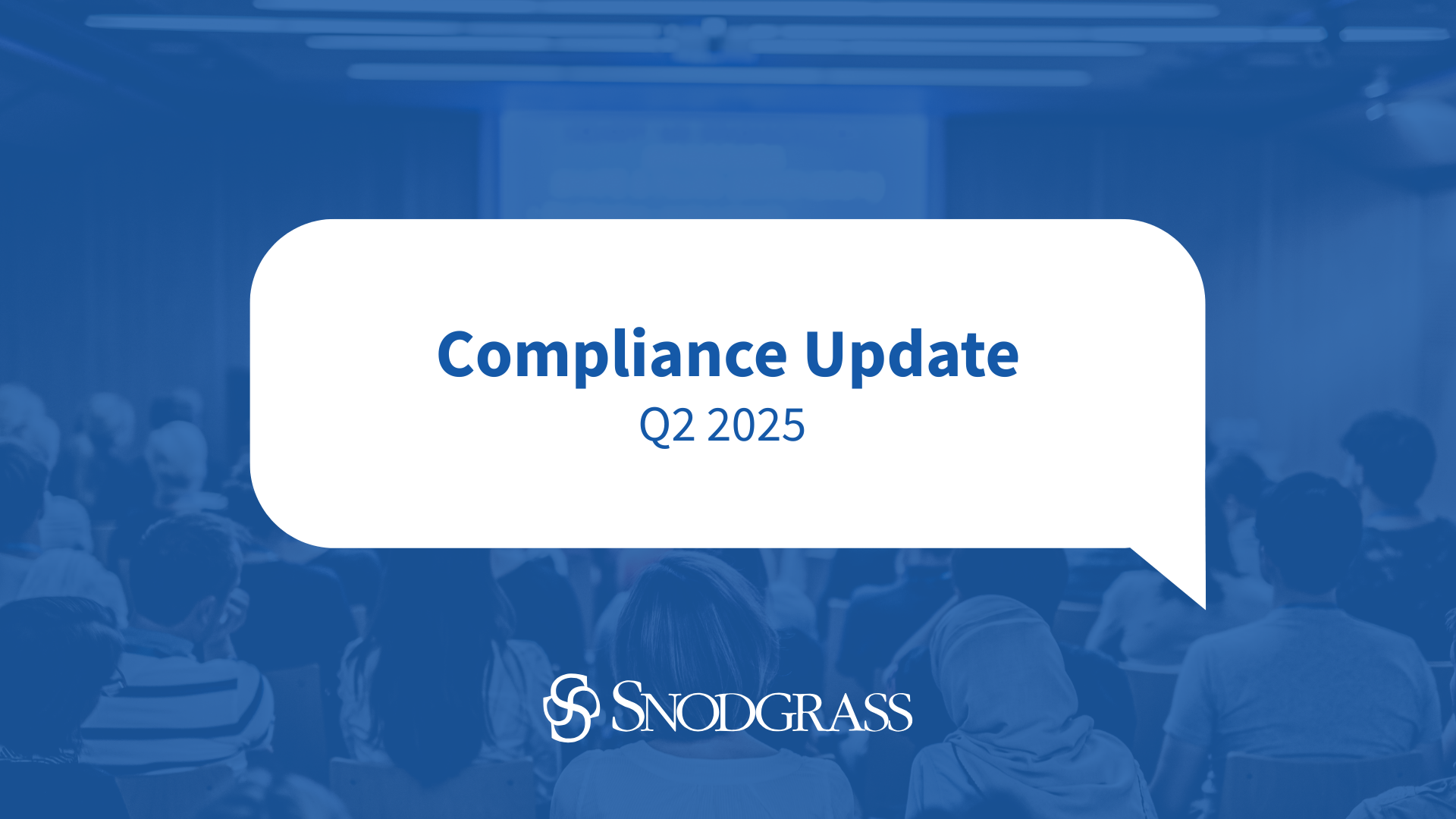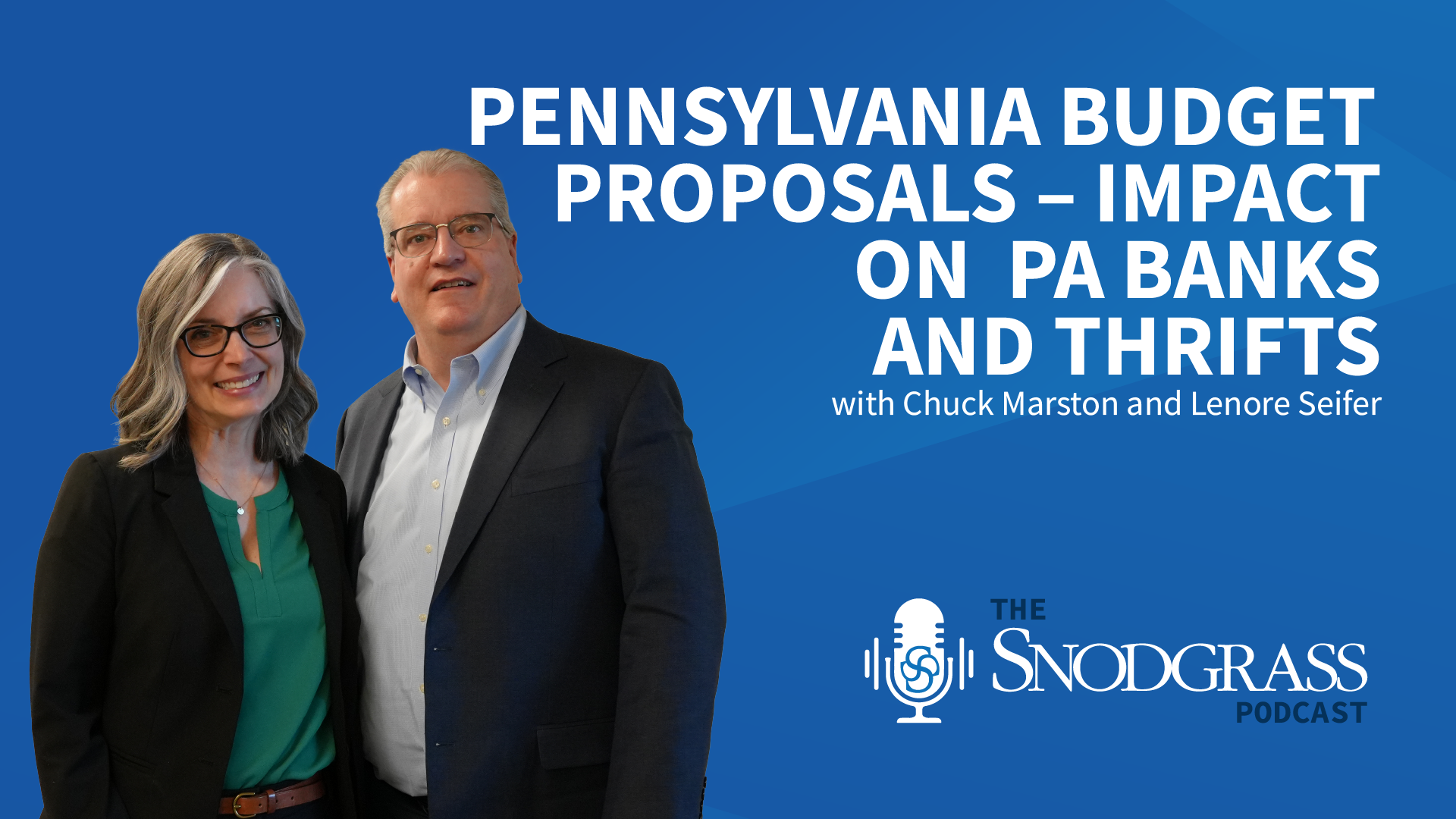Community Reinvestment Act: Revision of Small and Intermediate Small Bank and Savings Association Asset Thresholds
On December 29, 2022, the Office of the Comptroller of the Currency (OCC) announced revisions to the asset-size threshold amounts used to define “small bank or savings association” and “intermediate small bank or savings association” under the Community Reinvestment Act (CRA) regulations. The thresholds—which apply to any national bank, federal savings association, or state savings association (collectively, “bank”)—became effective on January 1, 2023. This bulletin adjusted the threshold amounts based on the annual percentage change in a measure of the Consumer Price Index.
Note for Community Banks
The bulletin applies to all national banks and federal savings associations subject to evaluation under the CRA.
Highlights
Beginning January 1, 2023, a bank that, as of December 31 of either of the prior two calendar years, had assets of less than $1.503 billion is a “small bank or savings association” under the CRA regulations. A “small bank or savings association” with assets of at least $376 million as of December 31 of both of the prior two calendar years and less than $1.503 billion as of December 31 of either of the prior two calendar years is an “intermediate small bank or savings association” under the CRA regulations.
For further information about how these revised asset-size thresholds are applied, visit the CRA page on the Federal Financial Institutions Examination Council’s website.
https://www.occ.gov/news-issuances/bulletins/2022/bulletin-2022-28.html
Agencies Announce Dollar Thresholds in Regulation Z and Regulation M for Exempt Consumer Credit and Lease Transactions
On October 13, 2022, the Federal Reserve Board and the Consumer Financial Protection Bureau announced the dollar thresholds used to determine whether certain consumer credit and lease transactions in 2023 are exempt from Regulation Z (Truth in Lending) and Regulation M (Consumer Leasing).
By law, the agencies are required to adjust the thresholds annually based on the annual percentage increase in the Consumer Price Index for Urban Wage Earners and Clerical Workers, known as CPI-W. Transactions at or below the thresholds are subject to the protections of the regulations.
Specifically, based on the annual percentage increase in the CPI-W as of June 1, 2022, Regulation Z and Regulation M generally will apply to consumer credit transactions and consumer leases of $66,400 or less in 2023. However, private education loans and loans secured by real property, such as mortgages, are subject to Regulation Z regardless of the amount of the loan.
Fair Lending: Revised Comptroller’s Handbook Booklet and Rescissions
On January 12, 2023, the OCC issued version 1.0 of the “Fair Lending” booklet of the Comptroller’s Handbook. This booklet provides information and examination procedures to assist OCC examiners in assessing fair lending risk and evaluating compliance with the Fair Housing Act, Equal Credit Opportunity Act, and Regulation B, the consumer protection regulation that implements the Equal Credit Opportunity Act.
Rescissions
The revised booklet replaces the booklet of the same title issued in January 2010. Also rescinded is OCC Bulletin 2010-4, “Compliance Policy: Fair Lending – Revised Booklet,” which transmitted the prior version of this booklet.
Note for Community Banks
The “Fair Lending” booklet applies to the OCC’s supervision of community banks.
Highlights
The revised booklet
- reflects changes to laws and regulations since this booklet was last published.
- reflects the current OCC approach to fair lending examinations.
- includes new and clarified details on examination scenarios.
- includes clarified and expanded risk factors for a variety of examination types.
- includes clarifying edits regarding supervisory guidance, sound risk management practices, and applicable legal standards.
- revises certain content for clarity.
https://www.occ.gov/news-issuances/bulletins/2023/bulletin-2023-2.html
Federal Deposit Insurance Corporation (FDIC) Announces 45-Day Extension of Comment Period for Proposed Changes to its Regulation Regarding the FDIC Official Sign, Advertising Statement, and Misrepresentations of Deposit Insurance
On January 30, 2023, the FDIC announced a 45-day extension to the public comment period for proposed changes to its regulations relating to the FDIC’s official sign, the FDIC’s official advertising statement, misrepresentations of deposit insurance coverage, and misuse of the FDIC’s name or logo. Comments must be received by the FDIC no later than April 7, 2023.
On December 13, 2022, the FDIC announced a Notice of Proposed Rulemaking (NPR) to modernize part 328 of its regulations and provided for a 60-day comment period following formal publication in the Federal Register (87 FR 78017), which occurred on December 21, 2022. After receiving requests to extend the comment period, the FDIC determined that a 45-day extension of the comment period is appropriate and will provide additional opportunity for the public to prepare comments and address the matters raised by the NPR.
The proposed regulation would modernize the rules governing the use of the official FDIC sign and insured depository institutions’ (IDIs’) advertising statements to reflect how depositors do business with IDIs today, including through digital and mobile channels. The proposed rule also would clarify the FDIC’s regulations regarding misrepresentations of FDIC deposit insurance coverage by addressing specific scenarios where consumers may be misled about whether their funds are protected by deposit insurance. The changes would enable consumers to better understand when they are doing business with an IDI and when their funds are covered by the FDIC’s deposit insurance.
https://www.fdic.gov/news/press-releases/2022/pr22085.html
Consumer Financial Protection Board (CFPB) Proposes Rule to Rein in Excessive Credit Card Late Fees
Proposed rule seeks to close loophole exploited by companies to hike fees with inflation. The CFPB proposed a rule to curb excessive credit card late fees that cost American families about $12 billion each year. Major credit card issuers continue to profit off late fees that are protected by an expansive immunity provision. Credit card companies have also relied on this provision to hike fees with inflation, even if they face no additional collection costs. The proposed rule would help ensure that over-the-top late fee amounts are illegal. Based on the CFPB’s estimates, the proposal could reduce late fees by as much as $9 billion per year.
“Over a decade ago, Congress banned excessive credit card late fees, but companies have exploited a regulatory loophole that has allowed them to escape scrutiny for charging an otherwise illegal junk fee,” said CFPB Director Rohit Chopra. “[The] proposed rule seeks to save families billions of dollars and ensure the credit card market is fair and competitive.”
When someone misses a payment due date, even if they paid a few hours after the deadline, the cardholder may be hit with an exorbitant late fee that far exceeds the credit card company’s costs to collect late payments. These excessive late fees may not be needed to deter late payments, nor be justified based on the consumer’s conduct in paying late. These late fees also may be on top of other consequences of paying late, such as a lost grace period on paying interest or a lower credit score, depending on how long the missed payment lasts.
Companies currently charge people as much as $41 for each missed payment, and these fees result in billions of dollars in annual junk fee revenue for credit card companies. The CFPB’s proposed changes, which would amend regulations implementing the Credit Card Accountability Responsibility and Disclosure Act of 2009 (CARD Act), would ensure that late fees meet the Act’s requirement to be “reasonable and proportional” to the costs incurred by issuers to handle late payments. Specifically, the proposed rule would lower the immunity provision for late fees to $8 for a missed payment as well as end the automatic annual inflation adjustment. The proposed rule would also ban late fee amounts above 25 percent of the consumer’s required payment.
The Federal Reserve Board, by regulation, created the immunity provisions to allow credit card companies to avoid scrutiny of whether their late fees met the reasonable and proportional standard. Over time, those provisions have risen with inflation to $30 for an initial late payment and $41 for subsequent late payments. The CFPB estimates that the income generated by the largest issuers from late fees is approximately five times greater than the collection costs that the companies incur for late payment violations. In 2020, for example, credit card companies charged approximately $12 billion in late fees, which represented more than 10 percent of all credit card interest and fees charged to consumers.
The proposed rule follows a request for comment on junk fees, a research report, and an advance notice of proposed rulemaking on credit card late fees that the CFPB issued last year. The CFPB’s proposed changes would, if finalized
Lower the immunity provision dollar amount for late fees to $8: The CFPB has preliminarily found that late fee income exceeds associated collection costs by a factor of five. Because the immunity provision currently allows issuers to charge late fees of up to $41, the CFPB believes that a late fee of $8 would be sufficient for most issuers to cover collection costs incurred as a result of late payments. The $8 immunity provision would apply to any missed payment. Companies would be able to charge above the immunity provision so long as they could prove the higher fee is necessary to cover their incurred collection costs.
End the automatic annual inflation adjustment: The CFPB’s proposal would eliminate the automatic annual inflation adjustment for the immunity provision amount. This adjustment is not required by law, nor is it necessarily reflective of how collection costs change over time. The CFPB would instead monitor market conditions and the immunity provision amount for potential adjustments as necessary.
Cap late fees at 25 percent of the required minimum payment: The current rule allows a card issuer to potentially charge a late fee that is 100 percent of the minimum payment owed by the cardholder. The CFPB proposes to restrict any late fee charge to 25 percent of the minimum payment to be more consistent with Congress’s intent to authorize only reasonable and proportional late fee amounts.
The proposal also seeks comment on other potential changes to CARD Act regulations. For instance, it requests comment on whether the CFPB’s proposed changes should apply to all credit card penalty fees, whether the immunity provision should be eliminated altogether, whether consumers should be granted a 15-day courtesy period, after the due date, before late fees can be assessed, and whether issuers should be required to offer autopay in order to make use of the immunity provision.
FDIC Clarifies Approach on Home Mortgage Disclosure Act (HMDA) Closed-End Reporting Threshold
The FDIC issued FIL-06-2023 to remind FDIC-supervised institutions of the recent change regarding the HMDA reporting threshold for closed-end mortgage loans and the FDIC’s supervisory approach for enforcing related requirements. For FDIC-supervised institutions that meet Regulation C’s coverage requirements, the threshold for reporting data on closed-end mortgage loans is now 25 loans in each of the two preceding calendar years. In addition, for closed-end mortgage data collected in the years 2022, 2021, or 2020, the FDIC does not intend to initiate enforcement actions or cite HMDA violations for certain failures to report such loan data, as further described in the FIL.
Like the CFPB, the FDIC recognizes that financial institutions affected by this change may need time to implement or adjust policies, procedures, systems, and operations to come into compliance with reporting obligations. Accordingly, for closed-end mortgage data, the FDIC plans to implement a supervisory approach for FDIC-supervised institutions consistent with the CFPB’s approach. For FDIC-supervised institutions that (1) are subject to Regulation C’s other coverage requirements, and (2) originated at least 25 closed-end mortgage loans in each of the two preceding calendar years, but fewer than 100 closed-end mortgage loans in either or both of the two preceding calendar years, the FDIC does not intend to initiate enforcement actions or cite HMDA violations for failures to report closed-end mortgage loan data for 2022, 2021, or 2020.
While any FDIC-supervised institution may elect to report data voluntarily for those years, the FDIC does not expect those institutions to collect and report data retroactively for closed-end mortgage loans covered by the Court’s order vacating the CFPB 2020 HMDA Final Rule.
Institutions affected by the Court’s order, and that meet the reporting thresholds of 25 closed-end mortgage loans in each of the two preceding calendar years as of 2023, should start collecting data in 2023 and reporting data in 2024.
https://www.fdic.gov/news/financial-institution-letters/2023/fil23006.html
CFPB Issues HMDA Reference Chart for 2023
On February 9, 2023, the CFPB published the “2023 Reportable HMDA Data: A regulatory and reporting overview reference chart.” The chart serves as a reference tool for data points that are required to be collected, recorded, and reported under Regulation C, as amended by HMDA rules, which were most recently issued in April 2020.
The chart also provides relevant regulation and commentary sections and guidance for when to report “not applicable or exempt” as found in Section 4.2.2 of the 2022 Filing Instructions Guide. The Bureau notes that the “chart does not provide data fields or enumerations used in preparing the HMDA loan/application register (LAR).”
Continuation of the National Emergency Concerning the Coronavirus Disease 2019 (COVID-19) Pandemic
The Office of the President has published a notice, 88 FR 9385, in the Federal Register continuing the national emergency declared on March 13, 2020, through May 11, 2023, when the president anticipates he will terminate it.
https://www.federalregister.gov/d/2023-03218
Federal Housing Finance Agency (FHFA) Announced Mandatory Use of the Supplemental Consumer Information Form
On May 3, 2022, the FHFA announced that Fannie Mae and Freddie Mac (the “Enterprises”) will require lenders to use the Supplemental Consumer Information Form (SCIF) as part of the application process for loans that will be sold to the Enterprises. The purpose of the SCIF is to collect information about the borrower’s language preference, if any, and on any homebuyer education or housing counseling the borrower received, so lenders can better understand borrower needs during the home buying process.
Specifically, the changes announced will require lenders to present the SCIF questions to borrowers and to report any data collected from the SCIF to the Enterprise purchasing the loan. Lenders will be required to adopt these changes and reporting requirements for loans with application dates on or after March 1, 2023. Response by borrowers to the preferred language question in the SCIF will remain voluntary.
“Collecting language preference and housing counseling information provides mortgage applicants with an additional method to inform lenders of their needs, enabling the industry to more fully respond to the nation’s growing diversity,” said FHFA Acting Director Sandra L. Thompson. “These steps will contribute to an equitable housing finance system that welcomes all qualified borrowers.”
“The CFPB welcomes the FHFA’s announcement today. As those lenders and financial companies that already collect the language preference of applicants and borrowers know, this information allows lenders to serve their customers better. The collection of applicants’ language preference does not violate the Equal Credit Opportunity Act or its implementing regulations,” said CFPB Director Rohit Chopra. “The CFPB is eager to see advances in broader language access to better serve all borrowers.”
The SCIF will be available via Mortgage Translations later this summer. Created by FHFA, Fannie Mae, and Freddie Mac, Mortgage Translations provides resources to assist lenders, servicers, housing counselors, and others in helping mortgage borrowers who have limited English proficiency. The site contains documents and resources available in English, Spanish, traditional Chinese, Vietnamese, Korean, and Tagalog. Mortgage Translations is part of FHFA’s Language Access Multi-Year Plan.
If you have questions about this update, please contact Tim Schofer at tschofer@srsnodgrass.com, Frank Antiga at fantiga@srsnodgrass.com, or Michael Caparoula at mcaparoula@srsnodgrass.com or 724-934-0344.



